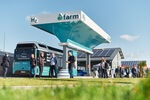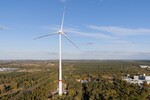News Release from Ramboll GmbH
Wind Industry Profile of
Ramboll PhD results show data measurements are the way to go for designing and operating offshore wind structures
Wind energy expects to witness a significant growth in the following years, both in terms of size and capacity. Parallel to this development, technological innovation will continuously be one of the drivers for capacity-building in the global renewable energy sector, including offshore wind. Moreover, while there have been major developments in the technology of turbines in the past years, the design procedures should also be updated to contribute to the rapid growth of the industry. Therefore, the main objective of the PhD project, titled “Towards offshore wind digital twins: application to jacket substructure”, is to develop a theoretical framework for including measurement data in the design and operation of offshore wind structures and provide enhanced certainty compared to current design and operation procedures.
Developing new structures more sustainably
To attain its ambitious climate goals, Denmark expects at least 7.6 GW of additional offshore wind by 2030, according to the Danish Energy Agency. Worldwide, the International Energy Agency expects at least 80 GW of additional offshore wind by 2030 so that the 2050 net-zero scenario materialises into reality. This gigantic capacity need for offshore wind will count for larger wind farms and hundreds of new structures. Data measurements are therefore crucial for optimising the design phase.
The study results of the PhD show that feeding measurement data in a digital twin framework already in the design phase can reduce the amount of steel for one single structure with 50 tonnes. With steel production being responsible of 8% of the global CO2 emissions, cutting down on the amount used for the construction of offshore wind structures can significantly contribute to a carbon footprint reduction.
Operating existing structures more optimally
It is a well-known principle that if an offshore wind structure is well-maintained, extending its lifetime can have a positive outcome not only for the operator, but also for the end-users. However, until now maintenance philosophies for support structures have been highly presumptive, typically based on physical inspections, which are both expensive and dangerous.
By introducing data-driven measurements based on the digital twin of the structure, where changes in its behaviour can be monitored live, operators are able to take accurate decisions on whether to extend lifetime. The data-driven theoretical framework has been applied on an existing offshore wind structure during the PhD showing that its lifetime can be increased with 19 years. This is considered a great result, that can give the operator a better view on how to maintain the offshore wind farm and improve operational related expenses.
This PhD project is particularly relevant for offshore wind farm operators, consulting engineering companies, and researchers interested in delivering value from operational data through the application of the digital twin concept. If you are interested in reading the paper, you are welcome to download it here.
For more information and research data on the digital twin technology follow this link and go to the download section.
- Source:
- Ramboll
- Author:
- Press Office
- Link:
- ramboll.com/...
- Keywords:
- Ramboll, Denmark, data measurements, designing, operating, offshore, wind structure, technology, research, turbine, digital twin, GW, capacity



























